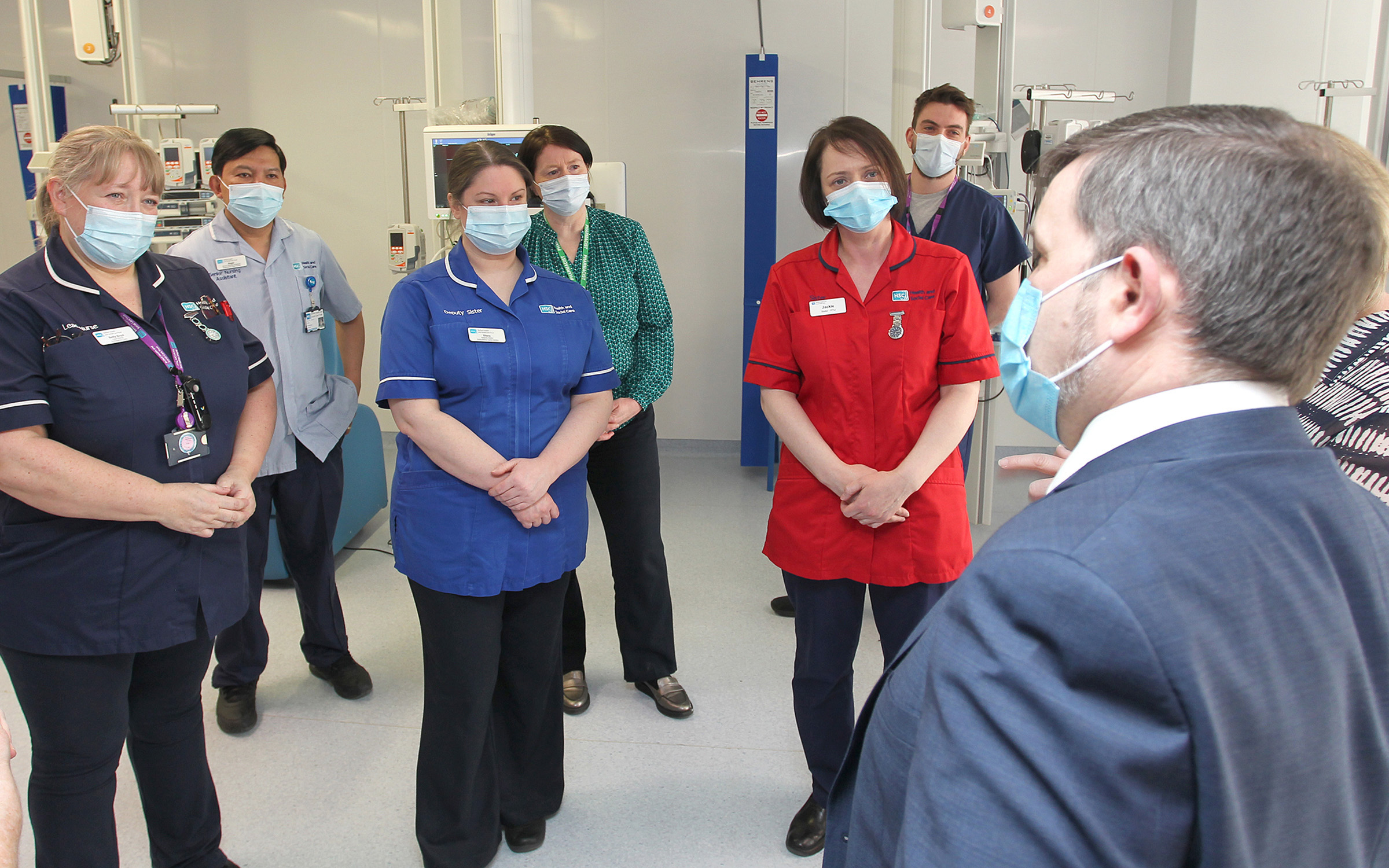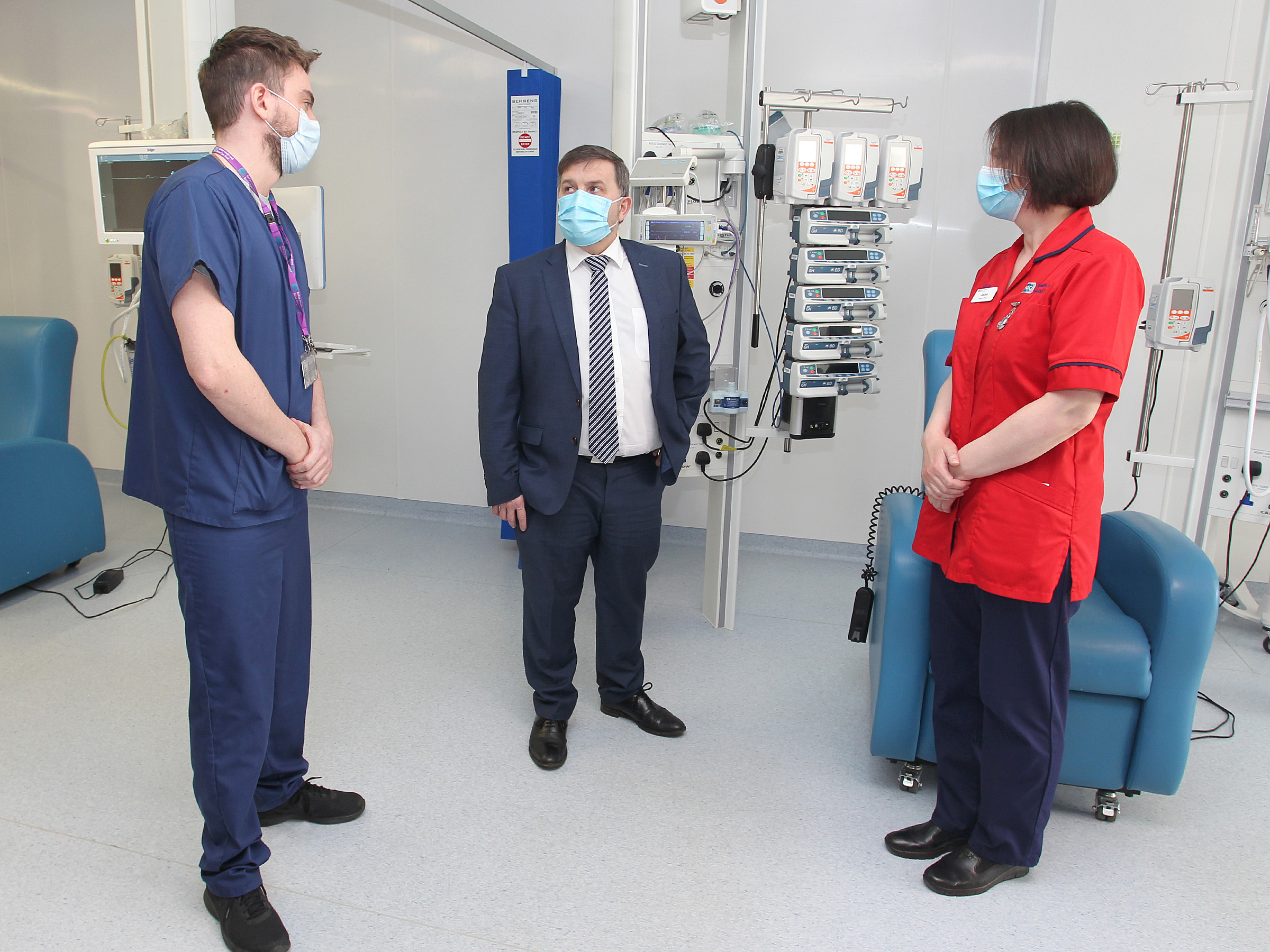Health Minister Robin Swann has praised the work of staff involved in delivering ground-breaking medicines to COVID-19 patients at highest risk of serious illness.

Since mid-December, more than 1,700 patients across Northern Ireland have received neutralising monoclonal antibody (nMAB) and antiviral treatments at Health and Social Care (HSC) Trust Outpatient COVID-19 Treatment services (OCTs), or oral antiviral medicine to take at home.
During a visit to the OCT at Belfast’s Mater Hospital, the Minister thanked the team reviewing and providing the treatments to patients at the highest risk of illness from COVID-19 infection.
Mr Swann said: “It’s very encouraging to hear that the most vulnerable patients in Northern Ireland are now benefiting from these ground-breaking medicines.
“These effective new treatments have been rolled out across Northern Ireland at pace and I want to commend clinical teams in our Health and Social Care Trusts who have worked exceptionally hard to ensure a quick set up, and the resilience that all the teams have shown to keep the service going in the face of the COVID-19 pandemic.
“Monoclonal antibodies and antivirals have been shown to improve survival and recovery time and provide an additional layer of support for patients. The roll-out of these treatments to the most vulnerable patients is a significant milestone in our continuing battle against COVID-19.”
The Mater Hospital is the OCT site for Belfast Health and Social Care Trust (BHSCT). This is one of six sites across the HSC trusts in Northern Ireland.
Dr Mark Cross, Deputy Medical Director and Clinical Lead for nMAB service at Belfast Trust, said: “Treatments previously only available to people who were hospitalised with the virus are now being offered to a limited group of eligible patients at highest risk of harm from COVID-19 in the community. These new treatments are used in the earliest stages of infection and need to be administered as soon as possible after a confirmed positive PCR test has been received or a positive lateral flow test result has been registered. The intravenous treatments are delivered in approximately 90 minutes.”
The Minister concluded: “The vaccination programme remains our first line of defence against COVID-19 but these treatments enable us to maximise our ability to protect vulnerable patients and prevent them from serious illness, thus helping to ease pressures on the health service.”
Notes to editors:
- Photo caption: Health Minister Robin Swann met the team at the Mater Hospital's Outpatient COVID-19 Treatment service.
- The treatments available are for people aged 12 and over who have tested positive, using a PCR test or lateral flow test, for COVID-19 and are at highest risk of getting seriously ill. Further information can be found at NI Direct Treatments for coronavirus (COVID-19).
- A doctor or specialist will confirm if you are eligible for treatment. A full list of eligible conditions is available at Interim Clinical Commissioning Policy
- If you are eligible for treatment because you have a condition that put you at highest risk from COVID-19 infection and you have tested positive, using a PCR or lateral flow test, for COVID-19, it is important to start the treatment within the recommended time period. As well as receiving a message about your positive PCR or lateral flow test result, if eligible, you will receive a further message informing you that your local Trust may be in touch.
- Your local Trust will review information in your medical records and if you are suitable for such a treatment, will be in contact to discuss this further. This may be from an unknown or withheld number. If you don’t hear from your local Trust within a couple of days you can ask your GP practice to contact the Trust on your behalf. If you test positive for COVID-19 and do not receive any text message about treatment, but feel you are eligible, you can contact your GP practice to discuss this.
- Your local HSC Trust will advise which treatment, if any, is suitable for you once you have been reviewed by a doctor. nMABs are given to you through a drip in your arm (infusion) and will be given at a hospital site. Once you have been reviewed by a doctor, you will receive instructions on where and a suitable time to get the treatment as well as advice on how to safely get to the hospital as you are COVID-19 positive. If you are given an antiviral, it comes as either tablets or capsules you swallow, or it can be given through a drip in your arm (infusion). If you are given antiviral tablets or capsules these can be taken at home and your local HSC Trust will advise how this medication will be made available to you.
- As well as the highest risk patient group treatments, a national study called Panoramic is underway. The trial is open to people in the UK who have all three of the following: have tested positive for COVID-19 using a PCR or lateral flow test; have COVID-19 symptoms that started within the last five days; are aged 50 and over, or are aged 18 and over with a health condition that puts them at higher risk of getting seriously ill from COVID-19. Find out more about the University of Oxford COVID-19 antiviral trial on the Panoramic trial website.
- For media enquiries please contact the DoH Press Office by email pressoffice@health-ni.gov.uk.
- Follow us on Twitter @healthdpt.
- The Executive Information Service operates an out of hours service For Media Enquiries Only between 1800hrs and 0800hrs Monday to Friday and at weekends and public holidays. The duty press officer can be contacted on 028 9037 8110.


